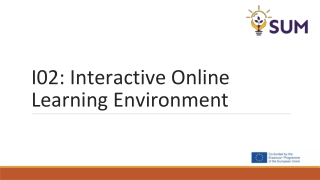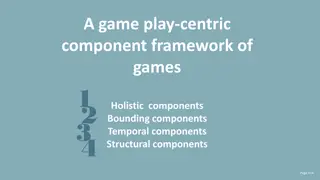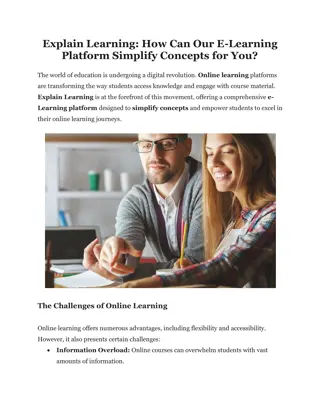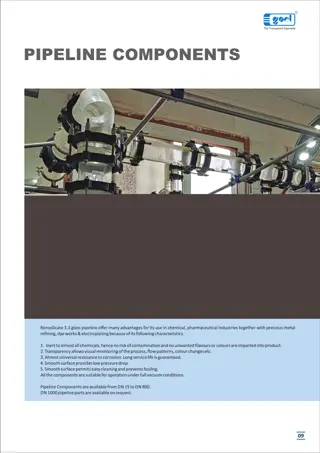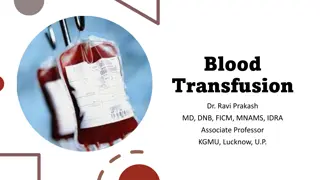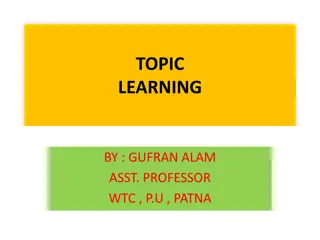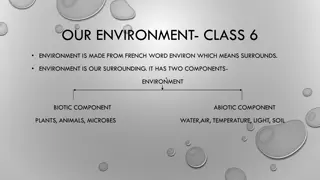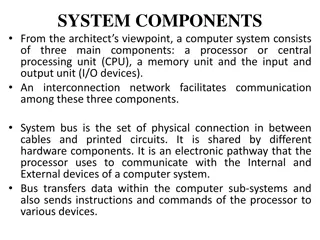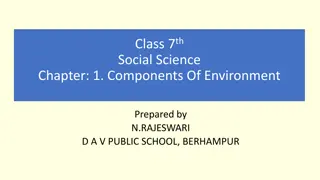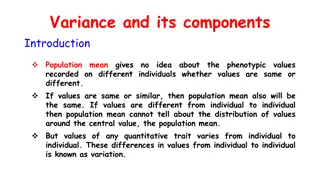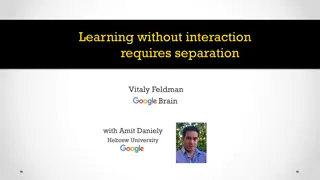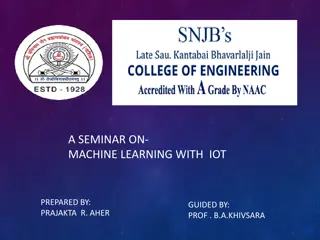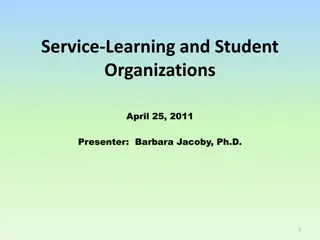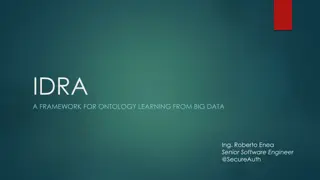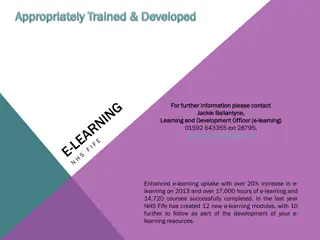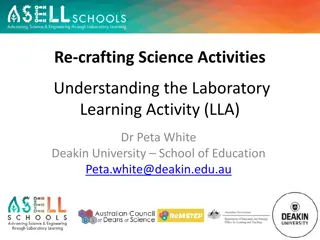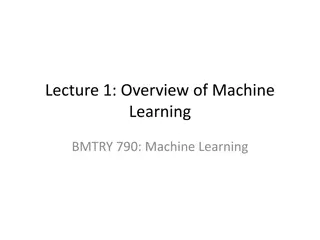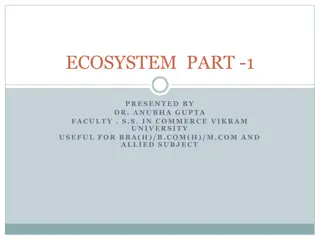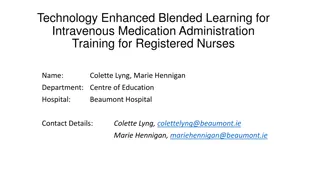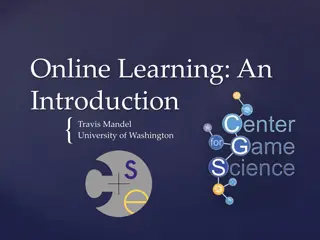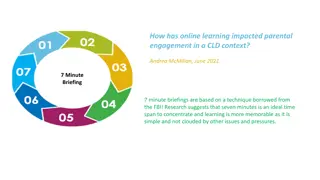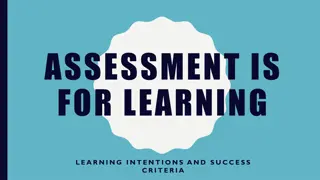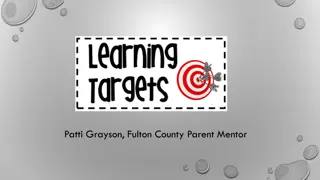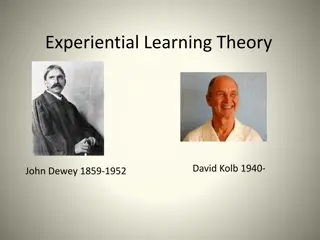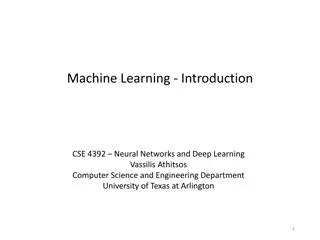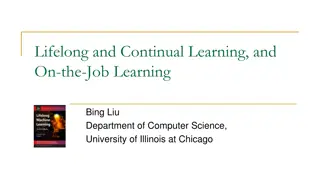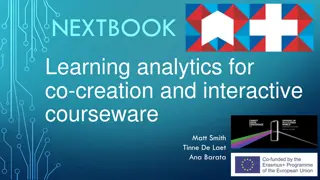Exploring Learning Theories and Nudging Theory in Educational Technology
Today's session at the University of Washington delves into popular learning theories influencing educational technology development, implementation, and evaluation. Dr. Taylor's work focuses on digitally mediated intergenerational learning, while the Educational Software Development Cycle underscor
7 views • 20 slides
I02: Interactive Online Learning Environment
Explore the IO2 interactive online learning environment, which focuses on delivering all online learning components and tools. The methodology includes an interactive learning platform, development and integration of learning tools, communication tools, and a mobile application. Dive into the IO2 le
0 views • 8 slides
Exploring Holistic Components in Game Design Frameworks
This content delves into a game play-centric component framework that encompasses various elements such as holistic components, bounding components, temporal components, and structural components. It discusses the setup and execution of game sessions, different modes of play, player goals, events, a
6 views • 22 slides
Explain Learning How Can Our E-Learning Platform Simplify Concepts for You
Explain Learning is at the forefront of this movement, offering a comprehensive e-learning platform designed to simplify concepts and empower students to excel in their online learning journeys. Know more \/\/explainlearning.com\/blog\/explain-learning-e-learning-platform-simplifies-concepts\/
1 views • 4 slides
Pipeline Components manufacturer & suppliers | Goel Scientific | Canada
We serve the best Pipeline Components, Pipeline Components Products, Bends, Crosses, Jacketed, Goel Scientific Glass Canada USA Ontario BC Quebec\nVisit : \/\/goelscientific.ca\/pipeline-components.html
4 views • 9 slides
Understanding Blood Transfusion: Components, Preparation, and Safety Measures
Blood transfusion is a crucial medical procedure involving the transfusion of different blood components to patients in need. This practice has evolved to include various components such as packed red blood cells, plasma, platelets, and more. The preparation of these components involves specific tec
1 views • 45 slides
Understanding the Components and Characteristics of Learning
Learning is a process that brings about a lasting change in an individual's knowledge and behavior. This article discusses the components of learning such as students, curriculum, and teachers, as well as the characteristics of learning which include growth, purposefulness, and intelligence. It also
0 views • 13 slides
Understanding Our Environment: Class 6 Overview
The environment, derived from the French word "environ" meaning surrounds, encompasses both biotic (living) and abiotic (non-living) components. Biotic components include plants, animals, and microbes, while abiotic components consist of water, air, temperature, light, and soil. Plants are producers
1 views • 9 slides
Understanding Computer System Buses: Components and Functions
A computer system comprises three main components - the CPU, memory unit, and I/O devices connected via an interconnection network, facilitated by the system bus. System buses reduce communication pathways, enabling high-speed data transfer and synchronization between components. Internal buses conn
3 views • 55 slides
Understanding Learning Intentions and Success Criteria
Learning intentions and success criteria play a crucial role in enhancing student focus, motivation, and responsibility for their learning. Research indicates that students benefit greatly from having clear learning objectives and criteria for success. Effective learning intentions should identify w
1 views • 24 slides
Understanding Components of the Environment in Social Science Chapter 1
The components of the environment play a crucial role in supporting life on Earth. The natural environment consists of physical and biological components that are interdependent. The Earth can be divided into four spheres: hydrosphere, biosphere, atmosphere, and lithosphere. The lithosphere, made of
2 views • 16 slides
Online Seminar: Theories of Learning in Initial Teacher Education
This collection of online seminar slides introduces pre-service teachers to major theories of learning, including the Science of Learning through cognitive neuroscience. The presentation aims to help educators consider implications for teaching, recognize theories in action, and pose critical questi
1 views • 11 slides
Understanding Variance and Its Components in Population Studies
Variance and its components play a crucial role in analyzing the distribution of quantitative traits in populations. By measuring the degree of variation through statistical methods like Measures of Dispersion, researchers can gain insights into the scatterness of values around the mean. Partitionin
1 views • 22 slides
Experiential Learning Portfolio Program at Barry University
Experiential Learning Portfolio Program at Barry University's School of Professional and Career Education (PACE) offers a unique opportunity to earn college credit for learning gained from work and community service experiences. Through this program, students can showcase their experiential learning
0 views • 16 slides
Exploration of Learning and Privacy Concepts in Machine Learning
A comprehensive discussion on various topics such as Local Differential Privacy (LDP), Statistical Query Model, PAC learning, Margin Complexity, and Known Results in the context of machine learning. It covers concepts like separation, non-interactive learning, error bounds, and the efficiency of lea
0 views • 14 slides
Seminar on Machine Learning with IoT Explained
Explore the intersection of Machine Learning and Internet of Things (IoT) in this informative seminar. Discover the principles, advantages, and applications of Machine Learning algorithms in the context of IoT technology. Learn about the evolution of Machine Learning, the concept of Internet of Thin
0 views • 21 slides
Understanding Ecosystems: Structure, Components, and Functions
Ecosystems are intricate units where living organisms interact with each other and the environment. They consist of biotic (living) and abiotic (non-living) components, interrelated in a chain of interactions. Biotic components include autotrophs, heterotrophs, and decomposers, while abiotic compone
0 views • 15 slides
Innovative Learning Management System - LAMS at Belgrade Metropolitan University
Belgrade Metropolitan University (BMU) utilizes the Learning Activity Management System (LAMS) to enhance the learning process by integrating learning objects with various activities. This system allows for complex learning processes, mixing learning objects with LAMS activities effectively. The pro
4 views • 16 slides
Understanding Blood Components and Their Administration
Effective blood transfusion therapy relies on the availability and proper administration of various blood components. Separating blood components allows for better patient care by matching transfusions to individual needs and avoiding unnecessary components. Different blood products like packed red
1 views • 27 slides
Exploring Service-Learning and Student Success in Higher Education
This presentation by Dr. Barbara Jacoby delves into the intersection of service-learning and student organizations, emphasizing the public purpose of higher education, student engagement in learning, and the importance of learning outcomes and assessment. It covers fundamental principles, designing
2 views • 23 slides
Unlocking the Power of Online Learning with Jenifer Grady
Explore the transformative nature of learning through online platforms with insights from Jenifer Grady. Understand the essence of learning, reasons behind learning, accessibility, and the concept of online learning. Discover how learning can be achieved anywhere, anytime, and delve into the world o
0 views • 26 slides
Enhancing Learning Through Active Strategies and Learning Styles
Implement active learning strategies to engage students, deliver and review content, and foster collaboration. Explore Kolb's Learning Styles to accommodate diverse learner preferences and maximize learning outcomes. Integrating learning activities based on individual styles can create a more effect
0 views • 22 slides
Understanding Components of Physical Fitness
Explore the various components of physical fitness such as flexibility, cardiovascular endurance, muscular strength, muscular endurance, and body composition. Learn the difference between health-related and skill-related fitness, identify the components of health-related fitness, and discover how th
0 views • 31 slides
Framework for Ontology Learning from Big Data with IDRA
IDRA (Inductive Deductive Reasoning Architecture) presents a comprehensive framework for ontology learning, focusing on data modeling and architecture components. ETL (Extract Transform Load) processes play a vital role in semantic enhancement of data, especially in identity and access governance co
0 views • 25 slides
NHS Fife E-Learning Success and Development Overview
NHS Fife has significantly enhanced its e-learning provision under the leadership of Jackie Ballantyne, with a notable increase in uptake and successful completion of courses. The development of over 80 e-learning programs has resulted in cost savings and improved accessibility to learning opportuni
0 views • 8 slides
Blended Learning Initiatives in Education: RYHT Presentation Overview
Blended learning, as defined in the State Board of Education presentation on November 17, 2015, is gaining traction in K-12 education for achieving student-centered learning at scale. The presentation highlights the potential benefits of blended learning in enhancing student achievement through pers
0 views • 10 slides
Enhancing Science Education Through Laboratory Learning Activities
Explore the importance of laboratory learning activities (LLAs) in science education, focusing on contemporary science representation, inquiry skills, and conceptual learning. Discover the benefits of inquiry-based learning, teaching science inquiry skills, and incorporating more inquiry-based learn
0 views • 22 slides
Understanding Computer Hardware Components
Computer hardware refers to the physical components of a computer system that you can see and touch. This includes the system unit, which contains components such as the CPU (Central Processing Unit), motherboard, RAM (Random Access Memory), power supply, expansion cards, and modem. Understanding th
0 views • 22 slides
Introduction to Machine Learning in BMTRY790 Course
The BMTRY790 course on Machine Learning covers a wide range of topics including supervised, unsupervised, and reinforcement learning. The course includes homework assignments, exams, and a real-world project to apply learned methods in developing prediction models. Machine learning involves making c
0 views • 62 slides
Understanding Ecosystems: Components and Interactions
An ecosystem, as explained by Dr. Anubha Gupta from Vikram University, is a community of living organisms and their nonliving environment components working together. The ecosystem comprises biotic and abiotic elements, with producers, consumers, and decomposers playing vital roles in maintaining ba
0 views • 12 slides
Technology-Enhanced Blended Learning for IV Medication Administration Training
Registered nurses at Beaumont Hospital underwent a redesign in their training program, incorporating a technology-enhanced blended learning approach using a Learning Management System. The initiative aimed to align the program with required learning outcomes, enhance nurse learning experiences, and
0 views • 4 slides
Understanding Online Learning in Machine Learning
Explore the world of online learning in machine learning through topics like supervised learning, unsupervised learning, and more. Dive into concepts such as active learning, reinforcement learning, and the challenges of changing data distributions over time.
0 views • 49 slides
Impact of Online Learning on Parental Engagement in CLD Context
The global pandemic in 2020 led to the closure of schools, shifting learning to online platforms. This study explores how online learning has affected parental engagement in Culturally and Linguistically Diverse (CLD) contexts. Family Learning, distinct from homeschooling, plays a crucial role in en
0 views • 11 slides
Maximizing Student Learning Through Effective Assessment Strategies
Explore the importance of assessment for learning, learning intentions, and success criteria in educational settings. Discover how to create and implement effective learning intentions, success criteria, formative assessment, and feedback practices to drive student progress and achievement. Dive int
0 views • 49 slides
Importance of Learning Targets in Educational Settings
Learning targets play a crucial role in guiding educational sessions by outlining what learners are expected to achieve and how they will demonstrate their learning. They help keep everyone focused, aid in data collection for target groups, and act like GPS directions for learning goals. Learning ta
0 views • 18 slides
Next Gen Learning Program - High Potential Training Overview
Explore the ONTRAC Sample Large Scale Program for High Potential Next Generation learners. The program features innovative gamified learning components like Classroom Training, Opsync Simulation, Social Collaboration, and more. Participants engage in a variety of activities to enhance skills in inno
0 views • 18 slides
Understanding Experiential Learning Theory and its Applications
Experiential Learning Theory, developed by David Kolb and influenced by John Dewey, emphasizes the role of experience in learning. It consists of four modes - Concrete Experience, Reflective Observation, Abstract Conceptualization, and Active Experimentation - forming a continuous learning cycle. Th
1 views • 10 slides
Understanding Machine Learning: Types and Examples
Machine learning, as defined by Tom M. Mitchell, involves computers learning and improving from experience with respect to specific tasks and performance measures. There are various types of machine learning, including supervised learning, unsupervised learning, and reinforcement learning. Supervise
0 views • 40 slides
Lifelong and Continual Learning in Machine Learning
Classic machine learning has limitations such as isolated single-task learning and closed-world assumptions. Lifelong machine learning aims to overcome these limitations by enabling models to continuously learn and adapt to new data. This is crucial for dynamic environments like chatbots and self-dr
0 views • 32 slides
Enhancing Learning Through Co-Created Interactive Courseware and Learning Analytics
Explore the innovative concept of co-creation in interactive courseware and learning analytics to improve student learning outcomes. Discover how students collaborate in a social learning environment, track their progress, and engage in dialogic and constructive pedagogical strategies. Harness the p
0 views • 19 slides

